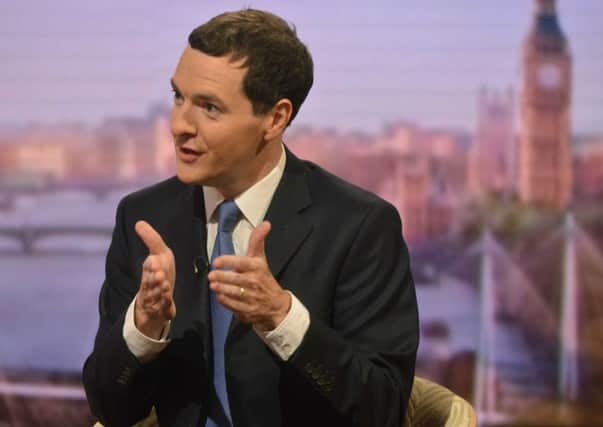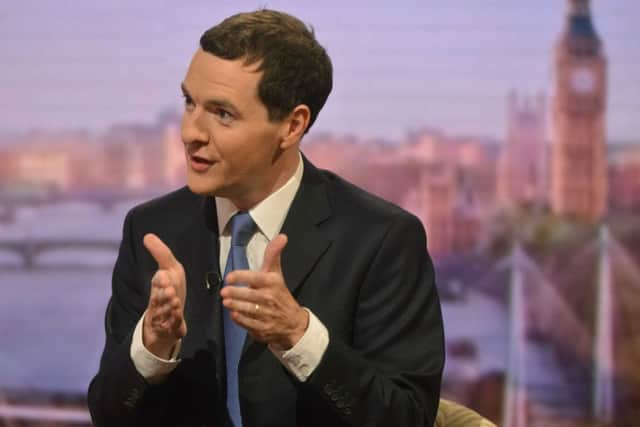Scottish independence: No camp pledges new powers


But the move, announced by Chancellor George Osborne, has been branded a “panic measure and bribe” by First Minister Alex Salmond, who insisted that the only prospect for real change is a Yes vote on 18 September.
The Better Together campaign is facing internal recriminations after a weekend poll by YouGov revealed a dramatic turnaroundfor supporters of independence, putting them ahead for the first time, by 51 per cent to 49 per cent.
Advertisement
Hide AdAdvertisement
Hide AdDavid Cameron was with the Queen at Balmoral yesterday as news of the Yes lead emerged and a Number 10 source insisted the Prime Minister would “strain every sinew to make the case for a No vote”. Mr Osborne has now said a timetable will be set out this week detailing how all three of the pro-Union parties’ current plans for more devolution will be moulded into a package of powers in the event of a No vote.


Labour will today ratchet up attempts to persuade wavering Scots to vote No, with Ed Miliband setting out a “social justice” case in a keynote speech at the TUC and shadow chancellor Ed Balls hitting the campaign trail in Aberdeen. Former prime minister Gordon Brown is to undertake a whistlestop six-day speaking tour of the country.
The latest poll means the No camp has surrendered a 22-point lead in just over a month. Although a different poll conducted by Panelbase from the weekend suggests the No camp is four points in front, the referendum battle now appears neck and neck just ten days from the vote. Meanwhile, it was reported yesterday that the Queen has a “great deal of concern” about the prospect of a Yes vote, although Buckingham Palace insisted she is “strictly neutral”.
The Chancellor yesterday moved to assure wavering voters they can be assured of change if they stick with the UK.
Mr Osborne said: “You will see in the next few days a plan of action to give more powers to Scotland. More tax powers, more spending powers, more plans for powers over the welfare state.
“That will be put into effect – the timetable for delivering that will be put into effect the moment there is a No vote in the referendum. The clock will be ticking for delivering those powers, and then Scotland will have the best of both worlds.
“They will avoid the risks of separation but have more control over their own destiny, which is where I think many Scots want to be.”
Advertisement
Hide AdAdvertisement
Hide AdIt is “clear” Scotland wanted more autonomy, Mr Osborne said, and the Conservatives, Labour and the Liberal Democrats had agreed to “deliver” on that.
All three parties have set out their own proposals for greater powers for Holyrood after a No vote. The measures being announced this week will be a timetable setting out the formal process to agree and implement a deal. This is likely to centre on the “Conference for a New Scotland”, which Scottish Secretary Alistair Carmichael has announced he will be staging after a No vote.
But the prospect of any package of new powers has been dismissed by Mr Salmond who insisted the No camp was only reacting to the disappearance of its lead in the Sunday Times poll.
“We’re expected to believe that secretly, behind the scenes, after hundreds of thousands of people have already voted (by post) there is a radical new deal on the constitution agreed by the Westminster parties.
“There is a radical new deal on the constitution -– it’s called independence. They’re not serious – this is a panicky last-minute measure because the Yes campaign is winning on the ground. The evidence for that is overwhelming. I’ve no doubt they’ll cobble something together because having failed to scare the Scottish people, the next step is to try to bribe us, but it won’t work because they have no credibility left.”
The coalition government ruled out calls for the so-called “Devo Max” third option appearing on the independence referendum ballot paper, Mr Salmond added.
“That’s why these people have no credibility left,” he added. “It shows the chaos, confusion and total disintegration of the No campaign because, quite clearly, if you were serious about something and thought it would help your campaign, you would announce it before people voted as opposed to after.
“This is a reaction to movement on the ground and the first opinion poll to show Yes in the lead.”
Advertisement
Hide AdAdvertisement
Hide AdBut the First Minister insisted that the Yes camp is still the underdog. He said: “As this campaign moves towards its climax, things on the ground and in the communities of Scotland are moving firmly in the Yes direction and it is precisely because of the total lack of confidence in the Westminster elite.”
Better Together campaign chief Alistair Darling hit the campaign trail around Loch Lomond yesterday and said every voter can now “tip the balance in this referendum”. He added: “We are very confident that we’re going to win, but people have to realise this is a close contest – it will go right to the wire.”
Mr Brown revealed that he will carry out a six-day, 30-visit tour of Scotland’s heartlands aimed at convincing undecided voters of the case for a “patriotic No vote”. He has already formally requested Westminster allocates time for debate immediately after the referendum to get a timetable for implementing more Holyrood powers.
“This is a decision not about me or this generation – it’s a decision about my children, it’s a decision about their future, their children’s future,” he said yesterday. “It’s irreversible and it’s not one that you can make without getting your views across to the maximum number of people.
“This is a completely different type of decision.”
He added: “We’re about to enter an economic minefield if we have independence and people have got to focus on that.
“I understand the protest, I understand the desire for change, I understand that people actually want a change of government.”
MORE POWERS
What each of the unionist parties have been offering in the event of a No vote on 18 September.
LABOUR
• Tax powers MSPs should be able to vary tax by up to 15p, giving them the option of restoring the 50p rate for top earners – but there would be no power to cut the upper income tax rate, which currently sits at 45p.
Advertisement
Hide AdAdvertisement
Hide Ad• Housing benefit This should be devolved to Holyrood, allowing MSPs to scrap the UK government’s controversial under occupancy charge, branded the “bedroom tax” by Labour and other critics.
• Attendance Allowance This benefit is paid to disabled OAPs.
• Work programme The scheme manages services for the unemployed.
CONSERVATIVES
• Income tax Full control over income tax which would make the Scottish Parliament accountable for 40 per cent of the money it spent.
• VAT The Tories devolution commission said there was a case for a share of Scottish VAT receipts being assigned to the Scottish Parliament.
• Welfare Holyrood should be given responsibility on welfare issues which relate to devolved areas, such as housing benefits, and attendance allowance.
LIBERAL DEMOCRATS
• Tax Raising Holyrood would raise and spend most of its own taxes under the Lib Dems’ federal-style “home rule” plans devised by Sir Menzies Campbell.
• Borrowing powers Scotland would be able to borrow on its own terms under the plans.
Advertisement
Hide AdAdvertisement
Hide Ad• Barnett Formula The system use to work out Scotland’s share of public spending would be replaced with a “needs-based” set-up.
• The Act of Union The 1707 agreement between Scotland and England would be scrapped and replaced with a declaration of federalism.
SEE ALSO